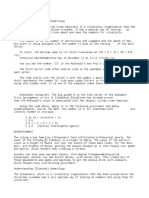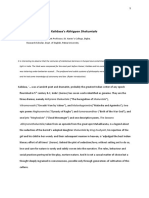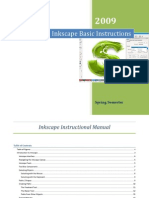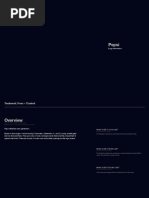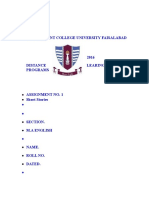67%(3)67% found this document useful (3 votes)
G M Muktibodh
G M Muktibodh
Uploaded by
Rucha TakleThe document discusses two poems by Hindi poet Gajanan Madhav Muktibodh - "The Void" and "So Very Far". "The Void" depicts a void or emptiness as a terrible monster that spreads moral and spiritual emptiness from person to person. It visualizes the void as having a huge mouth that eats away human values and turns people into beasts. "So Very Far" criticizes the rich sections of society that have risen through corruption, and highlights the wide economic disparity and the poet's feelings of helplessness to improve the situation as an intellectual.
Copyright:
© All Rights Reserved
Available Formats
Download as PPSX, PDF, TXT or read online from Scribd
Download as ppsx, pdf, or txt
G M Muktibodh
G M Muktibodh
Uploaded by
Rucha Takle67%(3)67% found this document useful (3 votes)
The document discusses two poems by Hindi poet Gajanan Madhav Muktibodh - "The Void" and "So Very Far". "The Void" depicts a void or emptiness as a terrible monster that spreads moral and spiritual emptiness from person to person. It visualizes the void as having a huge mouth that eats away human values and turns people into beasts. "So Very Far" criticizes the rich sections of society that have risen through corruption, and highlights the wide economic disparity and the poet's feelings of helplessness to improve the situation as an intellectual.
Original Description:
Muktibodh
Copyright
© © All Rights Reserved
Available Formats
PPSX, PDF, TXT or read online from Scribd
Share this document
Did you find this document useful?
Is this content inappropriate?
The document discusses two poems by Hindi poet Gajanan Madhav Muktibodh - "The Void" and "So Very Far". "The Void" depicts a void or emptiness as a terrible monster that spreads moral and spiritual emptiness from person to person. It visualizes the void as having a huge mouth that eats away human values and turns people into beasts. "So Very Far" criticizes the rich sections of society that have risen through corruption, and highlights the wide economic disparity and the poet's feelings of helplessness to improve the situation as an intellectual.
Copyright:
© All Rights Reserved
Available Formats
Download as PPSX, PDF, TXT or read online from Scribd
Download as ppsx, pdf, or txt
67%(3)67% found this document useful (3 votes)
G M Muktibodh
G M Muktibodh
Uploaded by
Rucha TakleThe document discusses two poems by Hindi poet Gajanan Madhav Muktibodh - "The Void" and "So Very Far". "The Void" depicts a void or emptiness as a terrible monster that spreads moral and spiritual emptiness from person to person. It visualizes the void as having a huge mouth that eats away human values and turns people into beasts. "So Very Far" criticizes the rich sections of society that have risen through corruption, and highlights the wide economic disparity and the poet's feelings of helplessness to improve the situation as an intellectual.
Copyright:
© All Rights Reserved
Available Formats
Download as PPSX, PDF, TXT or read online from Scribd
Download as ppsx, pdf, or txt
You are on page 1/ 7
Gajanan Madhav Muktibodh (13 November
1917 – 11 September 1964) was one of the most
prominent Hindi poets, essayist, literary and
political critic, and fiction writers of the 20th
century.[He also remained assistant-editor of
journals like, Naya Khun and Vasudha etc. He is
widely considered one of the pioneers of
modern poetry in India. Muktibodh’s poetry is
experimental and intensely speculative.
‘The Void’ is a surrealistic poem which brings
out destruction and violence resulting from
excessive self absorption and a sense of
meaninglessness of life. The Void, or
nothingness is presented in a negative sense. It
signifies moral and spiritual vaccum which has
given rise to barbarism and cannibalism. This
void then spreads from one person to another
like an infectious disease and is therefore more
horrible and dangerous.
The void in has been depicted as a terrible monster inside everyone of us.
It is the void of spiritual sterility and so it denotes and connotes the
bankruptcy of all human values such as love ,sympathy and kindness.
The void has been visualized like a Dracula with huge jaws containing
flesh eating carnivorous teeth which have the capacity of grinding and
gobbling up everyone. Thus the poet portrays a Picture of corrupt human
state with moral vacuity in which every thing, all forms of life are
smothered and destroyed.
Through an inbuilt paradox , the poet says that the void is not empty but
stuffed with corruption and violence. The dearth of every kind which has
become natural to human beings is always demanding for more blood of
which there has been collected a pond full in the empty space inside the
dark jaws. The implication is that its a natural hunger has devoured the
human spirit in its jaws to turn man into beast ,naked and barbaric ,
utterly black, debased deprived and it has eaten all the humans from
within. Thus the poet creates a fantasy of the void as frightening monster
the presence of which is surely felt.
The poet says that this void though results from the state of self absorption, it does not
remain confined to the affected individual society. It is much more malignant than any
other conceivable contagion and exercise its malignant effect on whomsoever it comes in
contact or range. The evil forces manifested in this void on enlarging their domain and
thus grip the whole mankind. It creates more voids as the infected ones infect others and
thus the void expands and continues extending its frontiers of evil. The pronoun’s “I”
and “My” have been used for the void and “they”, ” those ” and “them” for the people
affected by the void.
the poet portrays the formidable power of the void’s evil prospering more speedily in
the modern world. The void has been depicted as a durable ,fertile, producing tools of
violence and the rejoicing at achievement. Thus the void breeds evil, anarchy, violence
and corruption which are always increasing. It is a paradox that death which is
supposed to kill is giving birth to fresh new children.
Here the new generation being born are symbolized by not life but by death which
further reinforces the ever going emptiness in the society.
In the concluding lines from the poem the poet depicts the void as the image of a
dehumanized society in which violence and injustice are not challenged but accepted as
a part of the social system. The void has overpowered us so much that we are
submerged in it and we are help less to do anything against it. Thus paradoxically it is
not the void that is within us, but it is who we are within the void. The void in fact is
everywhere ,moving about and spreading violence, causing destruction of all values and
we are helpless before its onslaught.
‘So Very Far’ was published in an anthology of
poems ‘Chand Ka Munh Terha Hai’ in 1964.
This poem too has a marxist flavour and shows
the poet’s anger at exploitation and the
injustice as well as his own helplessness in
setting things right. The poem is a bitter
criticism of the rich and influential sections of
the society, which have risen up the social
ladder through corruption and money power.
‘So Very Far’ focuses on the wide disparity between the
rich and the poor in our society and the helplessness of
the intellectuals like the poet in being unable to
improve the situation. The poet is acutely aware of the
role of corruption and money power in bringing about
upward social mobility. But due to the circumstances
in his life, he feels incapacitated to play his role of an
agent of change and cleanse the system.
The poem points towards the economic disparity in
society and total inaction on the part of the
intellectuals, who are supposed to reform it. The
poignancy of the situation is clear in poet’s realization
of the need of scavenger, and his inability to play that
role.
You might also like
- "THE LAND OF THE HALF-HUMANS" by Thangjam IbopishakNo ratings yet"THE LAND OF THE HALF-HUMANS" by Thangjam Ibopishak9 pages
- Untouchable Spring Is A Saga of Endless Struggle of Untouchables For Self-Respect, Equality and Empowerment. Discuss100% (1)Untouchable Spring Is A Saga of Endless Struggle of Untouchables For Self-Respect, Equality and Empowerment. Discuss2 pages
- Badal Sarkar and The Absurdist Theatre and The ExistentialismNo ratings yetBadal Sarkar and The Absurdist Theatre and The Existentialism2 pages
- Draupadis Nakedness - An Instrument of deNo ratings yetDraupadis Nakedness - An Instrument of de11 pages
- Write A Critical Appreciation of The Poem Tonight I Can Write0% (1)Write A Critical Appreciation of The Poem Tonight I Can Write2 pages
- Title of Mother of 1084 by Mahayshewta DeviNo ratings yetTitle of Mother of 1084 by Mahayshewta Devi2 pages
- The Shroud' by Munshi Premchand - Short Story Analysis100% (1)The Shroud' by Munshi Premchand - Short Story Analysis4 pages
- 1622365623ENGA - Sem-6 - CC 14 - A Critical Appreciation of David MaloufNo ratings yet1622365623ENGA - Sem-6 - CC 14 - A Critical Appreciation of David Malouf5 pages
- The Playboy of The Western World York NotesNo ratings yetThe Playboy of The Western World York Notes60 pages
- Justify The Title of The Novel 'Funny Boy'No ratings yetJustify The Title of The Novel 'Funny Boy'2 pages
- Acculturation and Diasporic Influence in Uma Parmeswaran's "What Was Always Hers" - Anju Mehara100% (1)Acculturation and Diasporic Influence in Uma Parmeswaran's "What Was Always Hers" - Anju Mehara4 pages
- The Grass Is Really Like Me by Kishwar Naheed PDF100% (1)The Grass Is Really Like Me by Kishwar Naheed PDF3 pages
- What's The Use of Theorizing About The Arts - 1No ratings yetWhat's The Use of Theorizing About The Arts - 116 pages
- Tintern Abbey: William Wordsworth - Summary and Critical AnalysisNo ratings yetTintern Abbey: William Wordsworth - Summary and Critical Analysis3 pages
- Sweet Warrior When Shall I Have Peace With You by Edmund Spenser's Whole Summary100% (1)Sweet Warrior When Shall I Have Peace With You by Edmund Spenser's Whole Summary2 pages
- A Study of Symbolism in Fire and The RainNo ratings yetA Study of Symbolism in Fire and The Rain4 pages
- Reading Poetry: Lesson 21: Beyond The Ash Rains' by Agha Shahid AliNo ratings yetReading Poetry: Lesson 21: Beyond The Ash Rains' by Agha Shahid Ali7 pages
- Indianness of The Poem Night of The Scorpion100% (1)Indianness of The Poem Night of The Scorpion2 pages
- Q.Any 3 Examples of Brecht's Use of Alienation In?No ratings yetQ.Any 3 Examples of Brecht's Use of Alienation In?4 pages
- The Rival Ladies: "Look around the inhabited world; how few know their own good, or knowing it, pursue."From EverandThe Rival Ladies: "Look around the inhabited world; how few know their own good, or knowing it, pursue."No ratings yet
- A Reflection Paper To Heneral Luna and Goyo100% (1)A Reflection Paper To Heneral Luna and Goyo7 pages
- Using Filters To Highlight Unconnected Nodes On Analytical ModelNo ratings yetUsing Filters To Highlight Unconnected Nodes On Analytical Model3 pages
- "THE LAND OF THE HALF-HUMANS" by Thangjam Ibopishak"THE LAND OF THE HALF-HUMANS" by Thangjam Ibopishak
- Untouchable Spring Is A Saga of Endless Struggle of Untouchables For Self-Respect, Equality and Empowerment. DiscussUntouchable Spring Is A Saga of Endless Struggle of Untouchables For Self-Respect, Equality and Empowerment. Discuss
- Badal Sarkar and The Absurdist Theatre and The ExistentialismBadal Sarkar and The Absurdist Theatre and The Existentialism
- Write A Critical Appreciation of The Poem Tonight I Can WriteWrite A Critical Appreciation of The Poem Tonight I Can Write
- The Shroud' by Munshi Premchand - Short Story AnalysisThe Shroud' by Munshi Premchand - Short Story Analysis
- 1622365623ENGA - Sem-6 - CC 14 - A Critical Appreciation of David Malouf1622365623ENGA - Sem-6 - CC 14 - A Critical Appreciation of David Malouf
- Acculturation and Diasporic Influence in Uma Parmeswaran's "What Was Always Hers" - Anju MeharaAcculturation and Diasporic Influence in Uma Parmeswaran's "What Was Always Hers" - Anju Mehara
- Tintern Abbey: William Wordsworth - Summary and Critical AnalysisTintern Abbey: William Wordsworth - Summary and Critical Analysis
- Sweet Warrior When Shall I Have Peace With You by Edmund Spenser's Whole SummarySweet Warrior When Shall I Have Peace With You by Edmund Spenser's Whole Summary
- Reading Poetry: Lesson 21: Beyond The Ash Rains' by Agha Shahid AliReading Poetry: Lesson 21: Beyond The Ash Rains' by Agha Shahid Ali
- Q.Any 3 Examples of Brecht's Use of Alienation In?Q.Any 3 Examples of Brecht's Use of Alienation In?
- The Rival Ladies: "Look around the inhabited world; how few know their own good, or knowing it, pursue."From EverandThe Rival Ladies: "Look around the inhabited world; how few know their own good, or knowing it, pursue."
- Using Filters To Highlight Unconnected Nodes On Analytical ModelUsing Filters To Highlight Unconnected Nodes On Analytical Model
